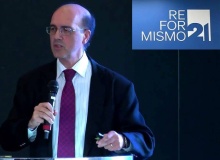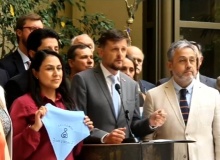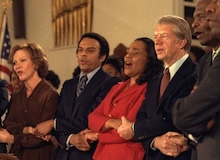


The decline of Catholicism in the country of Pope Leo XIV is linked to a loss of confidence in the institution, finds the Institute of Peruvian Studies.
.jpg)
We spoke in Berlin with Päivi Räsänen, the Finnish parliamentarian awaiting the outcome of a trial for publicly expressing her Christian beliefs. “I see a real threat to freedom. That’s why I always encourage Christians to make use of the rights we still have: freedom of speech, freedom of religion”.

Authorities, academics, and representatives of the evangelical, Catholic, Muslim and Jewish religions in Catalonia attended an event with parliamentarians.

Christian nationalism shows more concern with preserving one’s own ‘tribe’ and national identity than with sharing the Gospel with other ethnicities.

Evangelicals submit a report to the UN Human Rights Council, denouncing “cases of abuse of religious freedom, political rights and racism” in Bulgaria.

Politicians, whom are you going to address to your message? Only to the majorities? To the opinion leaders? To the lobbies? And whom are you going to listen to?

The event took place in the Cathedral of Faith and was widely covered by the Argentinean media, a sign of the growing importance of the evangelical presence in the country's social life.
.jpg)
Former agriculture minister Julia Klöckner says faith has helped her in life. She says the German Roman Catholic and the Protestant churches should ask themselves why they are losing so many members.
.jpg)
The European Evangelical Alliance does politics without the culture wars. “The EEA strongly believes the church must be nonpartisan, although individual Christians may join political parties”, says Julia Doxat-Purser.

The focus of the L4 Seoul Statement is not on dividing issues like the exact limitation of biblical inerrancy but rather about how we read the Scriptures.

This may be the end of an era, as it was for Augustine when Rome fell; or for the wartime generation enduring the terror of German nationalism. But this is not yet the end.

75% of the 246 members of the Swiss national parliament are members of a church institution – compared to only 58% of the population as a whole. Does it make a difference in the country's decision making?
.jpg)
In Spain, abolitionist NGO Amar Dragoste has studied the drastic increase of young women trafficked from Colombia and points to the rise of recruitment on platforms such as OnlyFans.

Five months after the election, the Austrian Evangelical Alliance says citizens “have the feeling that they are becoming increasingly voiceless”.
The takes effect on 1 February. Religious communities now need at least 500 adult members to be legal. Any activity on a public place must be notified and may be banned.

“We cannot accept the promotion of a free abortion law, while the crisis of vulnerable children continues to be forgotten”, said members of the national parliament.
.jpg)
The annulment of the presidential election won by the pro-Russian candidate leads to protests and uncertainty. An interview with Daniel Fărcaș, evangelical professor of philosophy.
.jpg)
A Christian must be willing to sacrifice his or her life for Christ and His Kingdom, but not for the whims of the ruler of the day and his delusions of a ‘holy nation’ with its supposed ‘historic mission’.
.jpg)
Evangelicals globally are divided over Trump. But whatever our views, we can represent the gospel better by adopting a more servantlike politics.
Cropped(1).jpg)
Ahead of February's elections in Germany, Frank Heinrich of the Evangelical Alliance explains to Evangelical Focus why a Christian vision introduces nuance into the overall tension and uncertainty.

Pundits warn that in 2025 we are heading back to the law of the jungle, a world where might is right and money manipulates.

The Congress Hall of Honour hosts the film ‘Amada’ and the signing of the Commitment to Life by senators and deputies from several parties.

Some evangelicals still do not know how to translate the Bible into more political areas than the defence of life and family; Carter opened a way for us to explore.

Many Middle Eastern countries recognize the existing, historic Christian communities but deny non-Christian citizens the right to espouse the Christian faith – and they actively persecute those who do.

With a large evangelical presence, politicians, intellectuals and social activists held the Transatlantic Summit for freedom and the culture of life in Madrid.

Las opiniones vertidas por nuestros colaboradores se realizan a nivel personal, pudiendo coincidir o no con la postura de la dirección de Protestante Digital.